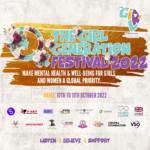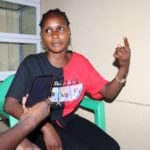“As the president of The Women’s Movement set up by ActionAid Senegal, we will continue to join other organizations and the community so that Female Genital Mutilation/Cutting (FGM/C) practice is completely eradicated in this region,” Adja Anta Ndiaye authoritatively says.
According to data, the prevalence of FGM/C in Senegal varies greatly among the 14 provinces. In provinces such as Kolda, Kedougou and Matam, the prevalence remains high at more than 80%, while in provinces such as Kaolack, it is less than 5%. Overall, 25% of girls and women aged 15-49 years in Senegal have been subjected to the practice.
Adja has taken the fight to end FGM/C in her community located in the remote part of the middle east of Senegal, the locality of Koussanar. Actively engaging herself in community activities, she is quick to note that the practice has shifted with rogue midwives being at the center stage performing the cut right at birth. ‘’Women take advantage of the birth of their daughters to cut them, that is why I follow the newborns in collaboration with the midwives,” she said.
In 1999, Senegal was among the first countries to criminalize FGM/C
Senegal was one of the first African Countries to criminalise FGM/C by amending the Penal Code which not only prohibits FGM/C in all forms, but also sexual harrassment, paedophilia and sexual assault, and sexual violence. However, even though the law is in place, few cases have been prosecuted since 1999 with enforcement and implementation being weak, which is similar to many other countries across the world that continue to face this vice.
Adja has been keen on organizing weekly meetings within the community sensitising the women to stand against the practice of FGM/C. Adja is lucky to have acquired life-changing skills such as awareness training and self-confidence thanks to the training she received from ActionAid Senegal which has proved to be very instrumental in her work.
“Female Genital Mutilation is considered a cultural norm. With the skills acquired, I’m able to advocate for an end to the practice through reformed cutters and survivor-based testimonies.” She specifies: ‘’The Fulani excise their daughters to prevent them from getting pregnant because, at the time of the excision, the excisor has methods to prevent the girls from not being able to have sexual relations.”

The Women’s Movement set up by Action Aid Senegal
As for the Socé (Mandingue) ethnic group, Adja says that a woman who is not cut is considered not pure and should not cook. Based on the awareness work they have done collectively; Adja proudly congratulates herself and The Women Movement: “I and the women of the movement have succeeded in transforming former cutters into champions aiming at bringing the end of FGM/C. They are now sensitizing the communities against this practice.’’
Whilst the End FGM/C movement continues to grow in Senegal, other challenges continue to shroud its success. For example, Senegal has the challenge of cross-border cutting as the country is surrounded by Gambia, Mali, and Guinea, which continue to practice FGM/C. Another emerging issue is cutting girls at a tender age secretly, which means very little information gets to the public arena in order to prosecute perpetrators.
“I am proud that the Women’s Movement now carries the mantle to end FGM/C for good in Koussanar and to influence other neighborhoods’ through, community dialgoues,strategic media communications, and advocacy.” Concluded Adja.



